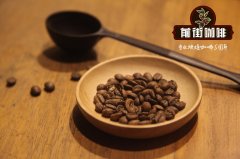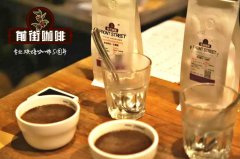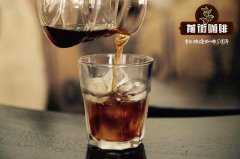The gold standard of Rosa Village in Ethiopia accounts for only 3.7% of the annual output.

Professional coffee knowledge exchange more coffee bean information please follow the coffee workshop (Wechat official account cafe_style)
The internal classification of Gesha Village in Ruoxia Village is also divided into competitive bidding, gold bid, red bid, green mark and Chaka batches. Zuoxia Village includes three varieties, namely, Gorixia (Gori Gesha), Zuoxia 1931 (Gesha 1931) and Illubabor (Essel original disease resistant variety).
Golden standard rose summer
SOE Golden Standard Rose Summer comes from Rose Summer Village in Ethiopia, and before it is imported, there is a strong aroma of jasmine, raspberry-like brilliant acid mixed with hot fruit flavor, after a little cooling, the flower and fruit aroma gradually fades away, the sweetness becomes higher, and the finish rhymes.
Batch No. 44-94 of ✧ Golden Cottage ✧ Yisuobi prostitute / Rose Xia Village
[Rarity Label] Ethiopia Gesha Village Coffee Farm Lot # 44 & # 94
(30KG production vacuum package)
National Ethiopia
Production area SNNPR Region
Ban Chi Kee (Bench Maji Zone)
Gori Gesha Forest
Rose summer village (Gesha Village Coffee Farm)
Master Adam Overton
Rachel Samuel
GPS E35.487 N6.538
1900-2100 meters above sea level
Variety Gori Gesha Forest
1931 kinds of Gesha
The annual rainfall is about 1500-2000 mm
Processing method 100% peach African scaffolding daily processing method
This is the third year that we have imported the works of the Rose Summer Village, which is created every year. Adam Overton is an out-and-out American, and his job is a film show, while his wife, Rachel Samuel, is a native of Ethiopia and a movie star. In 2007, people were invited to Yisuobi to make a film about coffee. With the process of filming, the land and people in Yisuo became more and more deeply connected with each other. As a result, the desire of Yisuobi to build their own love sprouted. All this has made a breakthrough after people met William Bout, and it has a lot to do with William Bout in terms of the selection of the location, variety, and disposal of the goods. So far, William Bout still goes to visit every year and will stay after the coffee is processed.
In Ruoxia Village, a total of three varieties have been planted. The first variety is Gori Gesha, which is collected from the Gori primeval forest, accounting for 43.7% of the total. The second species is Illubabor from Illubabor forest, which accounts for about 20% of all species. The last product is the well-known Rosa 1931 (Gesha 1931). In terms of planting type and flavor characteristics, this variety is closest to the Rosa species planted in modern Panama, accounting for about 37.3% of all species.
In the 2018 production season, the new distribution system of the rosy summer village bank divides all batches into four internal levels, with a view to further improving quality control.
The highest grade is Auction, which accounts for only 3.7% of Taiwan's annual output. We rejoined Taiwan's Tour Cup sharing session with owner Rachel Samuel and customer William Bout (Willem Boot) in June, and the standard fee for the highest batch was recorded again at US $1050 per pound. The GVA 05 batches under our joint efforts with the roasters in Taiwan and Hong Kong were also sold out before the arrival of the air cargo.
END
Important Notice :
前街咖啡 FrontStreet Coffee has moved to new addredd:
FrontStreet Coffee Address: 315,Donghua East Road,GuangZhou
Tel:020 38364473
- Prev

What is charcoal coffee? What are the origin and characteristics of charcoal-roasted coffee?
Professional coffee knowledge exchange more coffee bean information Please pay attention to the coffee workshop (Wechat official account cafe_style) authentic charcoal roasted coffee is the use of carbon fire deep roasting, dark color, mellow taste, taste this coffee does not feel sour at all, coffee drinking will have a different flavor. Charcoal roasted coffee is known as the world's bitterest coffee, while charcoal roasted coffee was invented by the Japanese.
- Next

Geisha Iron pickup Coffee from Gekishan also known as Rose Summer
Professional coffee knowledge exchange more coffee bean information Please pay attention to the coffee workshop (Wechat official account cafe_style) which seems to come from Kyoto, but with the elegance and gentleness of Kyoto, how many famous guests are attracted to break through the manor, just to leave a rare afterscent in the proud sun. The geisha is a Tibica tree species originating from the Geisha Mountain (Geisha) in Ethiopia and from Costa Rica in 1963.
Related
- Detailed explanation of Jadeite planting Land in Panamanian Jadeite Manor introduction to the grading system of Jadeite competitive bidding, Red bid, Green bid and Rose Summer
- Story of Coffee planting in Brenka region of Costa Rica Stonehenge Manor anaerobic heavy honey treatment of flavor mouth
- What's on the barrel of Blue Mountain Coffee beans?
- Can American coffee also pull flowers? How to use hot American style to pull out a good-looking pattern?
- Can you make a cold extract with coffee beans? What is the right proportion for cold-extracted coffee formula?
- Indonesian PWN Gold Mandrine Coffee Origin Features Flavor How to Chong? Mandolin coffee is American.
- A brief introduction to the flavor characteristics of Brazilian yellow bourbon coffee beans
- What is the effect of different water quality on the flavor of cold-extracted coffee? What kind of water is best for brewing coffee?
- Why do you think of Rose Summer whenever you mention Panamanian coffee?
- Introduction to the characteristics of authentic blue mountain coffee bean producing areas? What is the CIB Coffee Authority in Jamaica?

